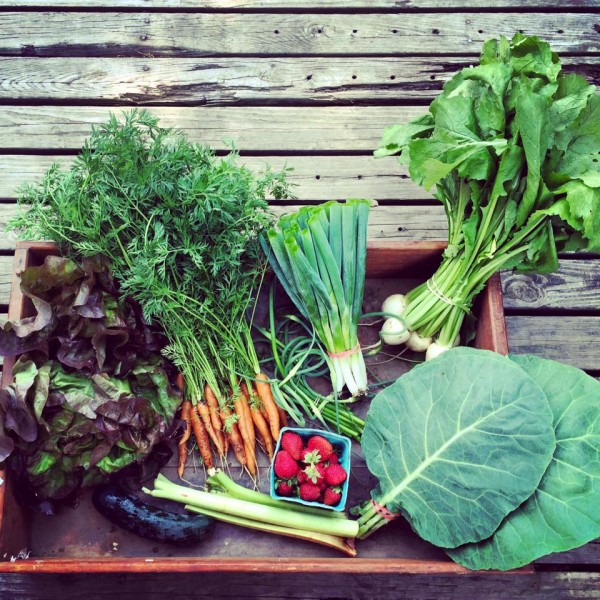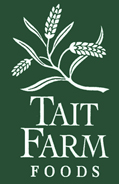-

Erin Donahue -

Christina Barkanic -

Brittany Trott -

Emily Wiley -

Jessica Reilley -

Chris Raines -

Will Nichols -

Emily Reddy -

Michele Marchetti -

Michele Frank -

James Gherardi -

Kit Henshaw -

Christina and Erin -

Kim Tait -

Erin McKinney -

Steve Spanelli -

Sam Komlenic -

Katherine Taylor Grofic -

James Eisenstein -

Jamie Oberdick -

Anna Lombardo -

LacCreta Holland -

Tony Ricci -

Local Food Journey -

Laura Young -

Kristin Camplese -

Harrison's Fresh + Local -

Danielle Matalonis -

Kristine A. -

Linda Weaver -

Naomi Elle Schwartz -

Dana Stuchul -

Cara McShane -

Brittany Smith -

Jessica Illuzzi - Frosty
-

Jessica Paholsky -

James Sechrengost -

Brad Yeckley -

Maya Althouse -

Jordan Reabold -

Kim Chase -

Maria Bryant - Alexandrea Scott
Rainy summer leads to challenges for growers at Tait Farms
Posted by Anna Lombardo on 07/23, 2015 at 08:34 AM

Rain has made vegetables like these in a Tait Farm CSA share harder to grow this summer. Photo via Tait Farm's Facebook page.
30 days of rain: when my sister, a rising freshman at Penn State, arrived for her orientation during the first weekend of July, this is what they told her. While since that weekend State College has had some relief from the wetness—notably, Arts Fest weekend saw sunny skies and high temperatures—since then, some inevitable showers and storms have passed through the area. The continual precipitation not only poses problems for those people worried about a potentially frizzy hair day (me), but also for another, unexpected group: farmers.
It seems strange that too much water could be an issue for food growers, but in fact it is a serious threat. Certain crops are susceptible to unusually wet weather, and depending on what a farmer grows, excess rain can destroy an entire yield. Kim Tait, from Tait Farm Foods in Centre Hall, tells me that when there is a lot of rain, tomatoes in particular are a cause for concern.
“We keep looking for signs of blight on the tomatoes,” she says. “But we haven’t been too adversely affected.”
Blight, Kim tells me, is a fungal disease in tomatoes that travels on water and air currents, and since the disease is extremely spreadable once it appears, tomato farmers must employ extra caution during rainy growing seasons. Kim says that blight can wipe out an entire acre of tomatoes overnight, and that right now, Tait Farm is taking preventative measures against it.
“We’re being proactive,” she explains. “We’re using organic sprays, hydrogen peroxide, and fish and kelp micronutrients on the tomatoes. They all help the immune system of the plants.”
Kim notes that all of these methods are approved for use on crops being grown organically. She also describes to me that Tait Farm grows their tomatoes on raised beds, so the plants don’t lie low and this reduces the risk of water damage. Water, when it collects, can submerge the roots of low-lying plants, and many crops don’t fare well in such conditions.
“Herbs, rosemary, and thyme particularly don’t like wet roots,” Kim says.
Excess water can cause issues during harvest periods as well, and this is a problem that Tait Farm has encountered directly. Kim and the rest of the staff at Tait Farm harvest their crops by hand, so when things are wet, the process is not only more work, but also “muddy and unpleasant” for those involved. And harvesting after heavy rain actually poses a risk for some crops: beans, for example, may rust if picked when wet. Garlic and onions, which grow underground as bulbs, must also be harvested in dry weather. Since periods without rain have been so sporadic, Kim stresses that work on the farm rarely follows the typical “9 to 5” workweek.
“You do what you can do when you can do it,” she says. “We’ve been having to work between rains.”
Breaks in-between rainfalls have been so minimal that some plants actually suffer due to lack of sunlight. Kim notes that their strawberries have not been “sweetening up as much as they might” simply because the sun has not shone enough, and as a result sugar content of the fruits has been low. But other crops are thriving with all of the water.
“It’s been a great year for greens,” Kim observes.
Her final comments reflect a willingness to work with the weather and to adapt to what have proved to be highly variable weather conditions.
“You just have to pay close attention,” she advises. “It’s easier to add water than to take it away. [The rain] is something that we have zero control over.”
![]() Author: Anna Lombardo
Author: Anna Lombardo
Bio: Suburban Philadelphian English major at Penn State Avid learner, runner, and eater
- Our Local Food Journey comes to an end
- Winter isn’t a quiet time at the farm
- Get the taste of garden season right now by growing herbs indoors
- All you need to know about PASA’s Farming for the Future conference









NO COMMENTS